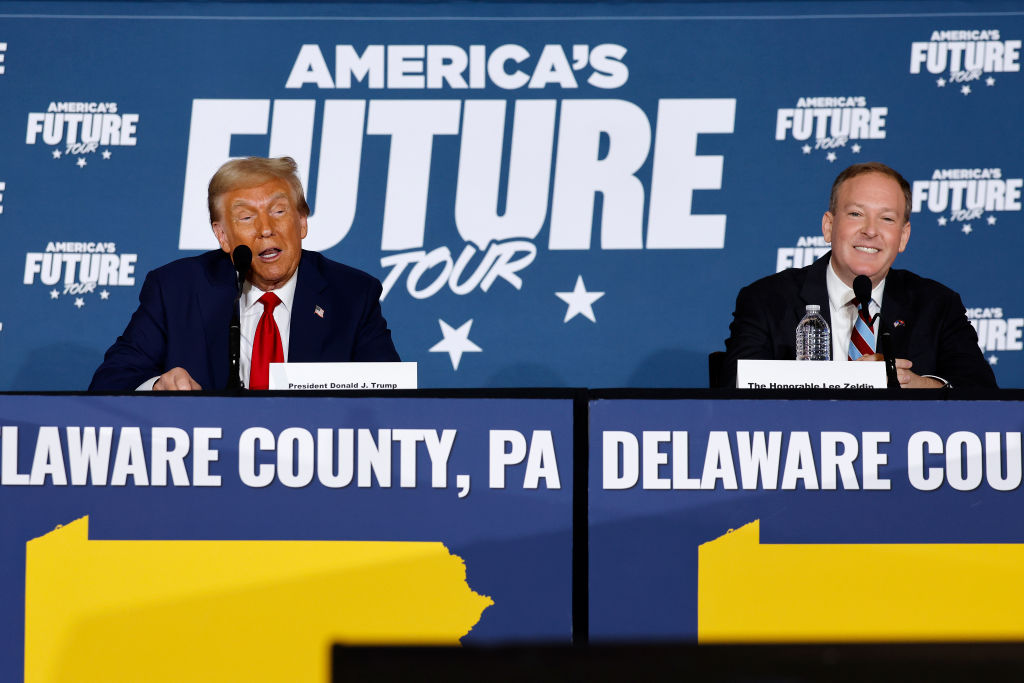After President-elect Donald Trump announced Lee Zeldin as his nominee to lead the Environmental Protection Agency, the former Republican representative from Long Island, New York, phoned into Fox News from Mar-a-Lago.
“You know, the EPA has been in some ways an enemy to a lot of these businesses across America, because they’ve had a long arm,” the Fox News presenter said after congratulating Zeldin on his nomination. “What do you plan to do at the EPA?”
Zeldin proceeded to talk vaguely about reversing a slate of regulations that “are forcing businesses to struggle” and sending American jobs overseas. “We have the ability to pursue energy dominance, to be able to make the United States the artificial intelligence capital of the world,” he said. “President Trump cares about conserving the environment,” Zeldin added. “It’s a top priority.”
And then he returned to what seemed to be his main point: “So I’m excited to get to work to implement President Trump’s economic agenda.”
The second half of the six-minute interview was spent discussing other matters — New York Governor Kathy Hochul’s recent phone call with Trump, and the indictment against the former president still making its way through New York’s Supreme Court.
The whole conversation offered an indication of what to reasonably expect from the EPA over the next four years: regulatory rollbacks for fossil fuel industries justified as boosts for the economy and platitudes about the importance of clean air and water, without any mention of how those things will be achieved simultaneously. In a similar rhetorical tact, Trump said himself that Zeldin “will ensure fair and swift deregulatory decisions that will be enacted in a way to unleash the power of American businesses, while at the same time maintaining the highest environmental standards, including the cleanest air and water on the planet.”
Without saying it directly, Zeldin signaled a tough road ahead for the thousands of community advocates that have spent years pushing for stronger regulations in the nation’s “sacrifice zones” — towns like Port Arthur, Texas, and Lake Charles, Louisiana, where a concentration of fossil fuel infrastructure and petrochemical plants dump cancer-causing pollutants into the air and water.
Zeldin, a 44-year-old attorney and former Army lieutenant, does not have a background in environmental policy. He made his foray into politics through the New York State Senate in 2011, serving until 2014. That year, he was elected to be the U.S. representative for the state’s 1st Congressional District, which encompasses much of Long Island.
As a congressman, Zeldin did not serve on any subcommittees overseeing environmental policy. He regularly voted against progressive climate and environment policies, earning him a lifetime score of just 14 percent from the League of Conservation Voters, an advocacy group that tracks congress members’ positions on environmental legislation. At the height of the COVID-19 pandemic, in 2020, he voted against an amendment to block the EPA from finalizing a Trump-era soot standard that would expose communities of color to additional air pollution that studies have linked to increased COVID mortality. The amendment ultimately passed.
In 2021, Zeldin voted against a bill that would require public companies to disclose information about the climate risks of their business models. That bill passed as well. The following year, he supported a failed bill that would have rescinded U.S. participation in the United Nations Framework Convention on Climate Change, a process that encourages international coordination on climate policy and includes participation in the annual U.N. climate conference.
Notably, Zeldin voted in favor of a bill that would require the EPA to set a drinking water standard for PFAS and PFOA, the so-called “forever chemicals” that accumulate in the environment and have been linked to a range of cancers and other serious health issues. Last year, a local news station found that 33 of Long Island’s 48 water districts have traces of these chemicals in their drinking water.
In 2022, Zeldin ran for governor of New York, and lost to Kathy Hochul.
Zeldin’s appointment marks a departure from current EPA Administrator Michael Regan, whose term will expire when Trump assumes office in January. Unlike Zeldin, Regan has a background in environmental science, and before being nominated as administrator served as secretary of North Carolina’s Department of Environmental Quality and worked as an air quality specialist in the EPA. As EPA administrator, he has overseen the Biden administration’s historic push toward environmental justice, which has included community engagement sessions, the strengthening of national standards for particulate matter, and the overhaul of regulations for many chemical plants.
It remains to be seen whether and to what extent Regan’s initiatives and regulations will persist over the years of a second Trump administration. Zeldin’s nomination will have to be confirmed with a vote from the Senate, which gained a Republican majority in the elections earlier this month.
If confirmed, Zeldin will have considerable power to shape the national direction of climate and environment policy. In addition to overseeing the enforcement of current environmental laws and regulations, he will be tasked with preparing the EPA’s annual budget, which determines how much funding will be allocated toward efforts like state oversight and air monitoring. A more fossil fuel-inclined administrator might choose to gut these parts of the agency, enabling industry-friendly state agencies like the Louisiana Department of Environmental Quality or the Texas Commission on Environmental Quality to regulate in the dark.
Trump ran on a platform that prioritized minimizing regulatory oversight and maximizing fossil fuel production. Zeldin’s appointment would be key for seeing that through.





